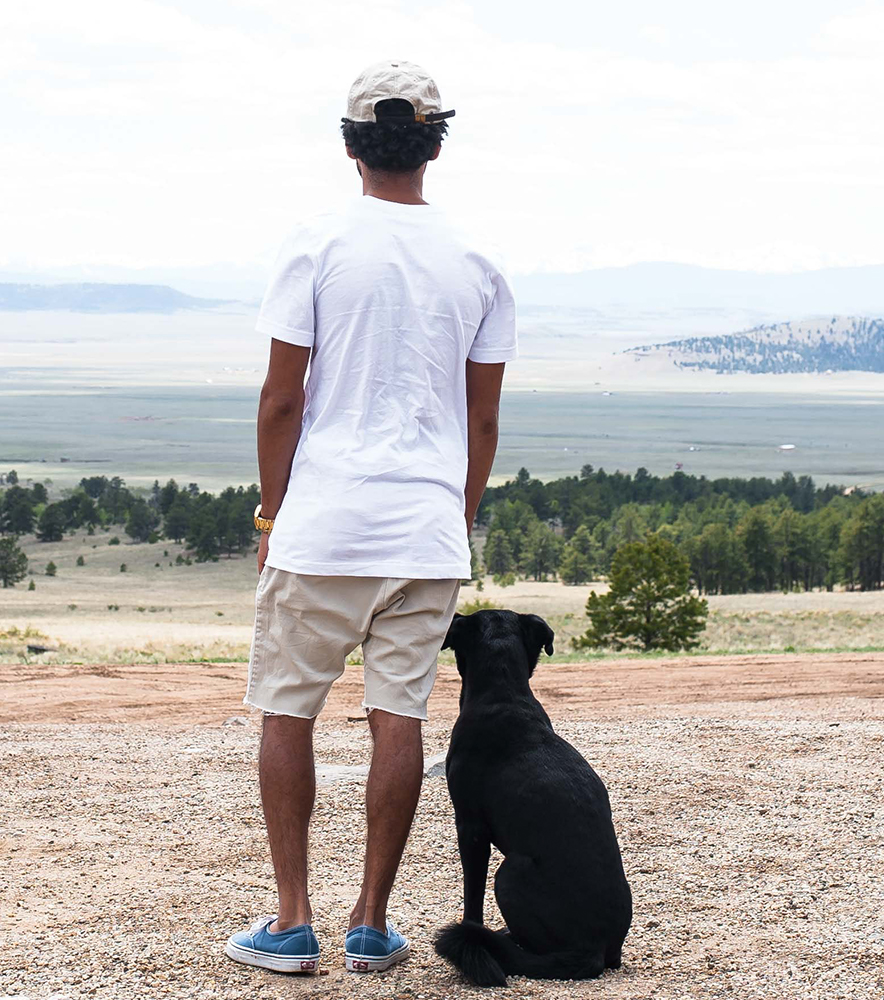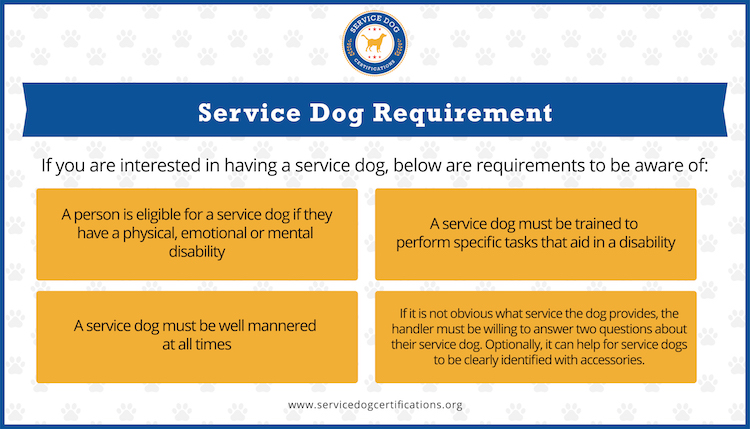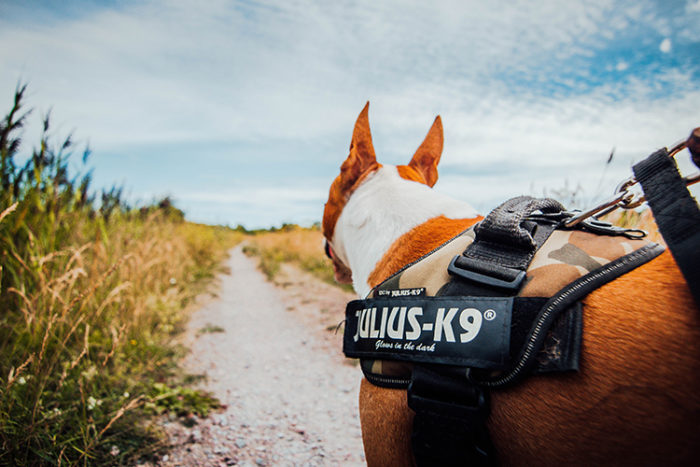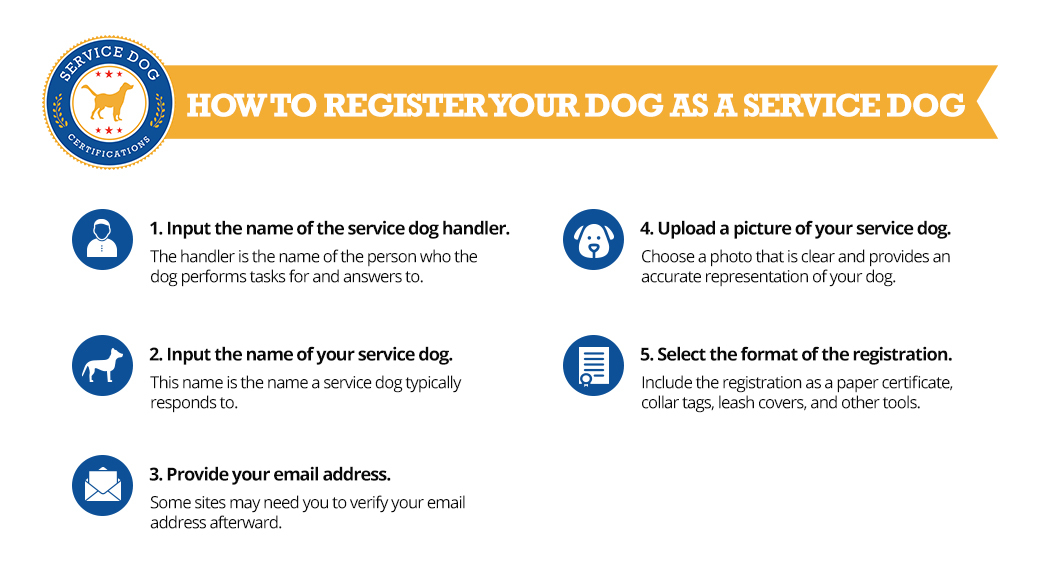Colorado Service Dog Requirements

If you have a disability, you may qualify for a service dog. Colorado law aligns with federal guidelines. These guidelines allow a person with a disability to reside, travel, and perform their activities of daily living with a service dog. Colorado also takes the extra step to protect service dogs who are still in training (Colorado Revised Statute 24-34-803), enabling them to train with their handlers in public areas. Continue reading for more information on Colorado service dog requirements.
Definition of a Service Dog
A service dog is trained to carry out specific tasks to assist a person with a disability. The disability can be physical, mental health-related, or medical. Colorado follows the American with Disabilities Act by restricting service animals to canines and miniature horses. A canine does not have to meet any specific requirements regarding height or weight. Colorado does, however, ban pit bulls but not from performing as service dogs.
The task a service dog performs must be related to their owner’s disability. The task(s) must be an act that their owner would not be able to perform easily or safely without assistance.

How is the Service Dog Trained?
To be a legitimate service dog, a dog must be trained to perform a task specific to their owner’s disability, as stated above. As an example, some service dogs are trained to bring objects such as medication bottles or walking canes. Others prevent their owners from falling by allowing themselves to be used as physical support. Training can be performed through a professional trainer or by the owner (or owner’s family).
Identification Requirements for a Service Dog in Colorado
Although Colorado does not require any identification requirements for service dogs, it’s always good to register your service dog. Doing so prevents any problems or misunderstandings from occurring, allowing your dog to perform their duty with fewer interruptions.
In Colorado, businesses are only legally allowed to ask two questions when it is not apparent that the dog is a service animal:
- Is this a service animal?
- What task has the animal been trained to perform?
Due to privacy concerns, business and private entities may not ask personal questions such as:
- Ask the owner to declare their illness or disability.
- Demand documentation regarding registration or training.
- Ask the owner to have the animals perform their assigned task as a demonstration.
Colorado does not require a service dog to have a vest or identification tag stating that they are service dogs.

Service Dog Registration in Colorado
Although service dog registration is not required by law in Colorado, it does provide peace of mind. Having an extra layer of protection and privacy for a dog and its owner can make all the difference. Service dogs perform better in calm environments with few interruptions, and registration allows just that. Having documentation at the ready garners legitimacy and respect from business owners and the public, enabling service dogs to remain undisturbed.
People who are interested in training, certification, and registration in Colorado can inquire with Service Dog Certifications, their local service dog trainers, or county animal enforcement department in the Colorado area.

Psychiatric Service Dog Requirements
Psychiatric service dogs are not the same as emotional support animals. Psychiatric service dogs are trained to perform a task that is tailored to meet a psychiatric patient’s needs. For instance, a psychiatric service dog may be trained to performing the following tasks:
- Remind their owner to take their psychotropic medications.
- Apply deep pressure therapy.
- Interrupt any self-harm behavior.
- Alert others when a person with a psychiatric disability becomes agitated.
Service Dog or Emotional Support Dog in Colorado
Colorado requires that a service dog or emotional support animal always be tethered or harnessed and must remain under their owner’s control at all times unless such a device interferes with their ability to perform. Any disruptive or dangerous behavior can have the animals removed from the area. Service dogs are working animals and can not play, be fed, or perform tasks for anyone else other than their owner.
If your dog isn’t specifically trained to perform a task, you may still qualify for an emotional support dog (ESA). Emotional support animals are recognized as assistance animals, but do not have the same access rights as service dogs. ESAs provide support and comfort to owners that suffer from depression, anxiety, PTSD, etc., and can live and travel with their owners without having to pay additional pet fees.
You and Your Service Dog in Colorado
After your dog finishes their training, you are approved by Federal law to bring your service dog with you in public. Because a service animal adds to the safety, well-being, and quality-of-life of its owners, service dogs are allowed into general public areas. This includes buses, trains, and other forms of public transportation.
If a service dog sounds like a good fit for your disability, you can speak to your healthcare professional for their consultation. Your healthcare professional may be able to point you in the right direction and help you obtain a service dog. It’s vital to ensure your service dog is well-behaved and able to tolerate the public. Aggressive outbursts, disruptive behavior, or violation of sanitary standards can prevent your service dog from doing their job.
Service dogs are a joy to have and can lighten the load for many people with disabilities. Knowing what you can and can not do with your service dog within Colorado is essential for both you and your dog.
About the Author: The writing team at Service Dog Certifications is made up of folks who really know their stuff when it comes to disability laws and assistance animals. Many of our writers and editors have service dogs themselves and share insights from their own experiences. All of us have a passion for disability rights and animals.
14 comments
Leave a Reply Cancel reply
Latest Posts

Dangerous Materials Hiding in Your Dog Products
Jake’s German Shepherd began developing strange rashes around his collar. Three vet visits later, they figured out the leather was treated with chromium — a chemical that irritates sensitive skin. Jake had no idea his dog’s collar contained industrial chemicals. Most dog owners don’t know what goes into the products they buy. Many companies use […]

Read More

Can You Bring a Service Dog to a Basketball Game?
Yes, you absolutely can bring your service dog to basketball games. Whether you’re heading to your local high school tournament, a packed college rivalry game, or splurging on NBA tickets, the Americans with Disabilities Act protects your right to be accompanied by your service dog anywhere the public can go. When you arrive, venue employees […]

Read More

Best Pet Health Insurance Providers
If you own a pet, you know how important — and expensive — vet care can be. One way to offset those costs is to purchase pet health insurance. Like typical health insurance, pet insurance is available at many price points, and can cover all, most, or only some of your vet-related costs. It can […]

Read More



I already been told that my Service dog isn’t welcome or any service dog welcome when a Senior Center reopens. Because they are having a therapy dog there to help the Seniors. They also said that they talked to their lawyer and the lawyer told them that they could do that. I’m very confused now. I thought that an Service Dog 🐕🦺 could go with me everywhere I went if she was trained and behaved.
I’m not an attorney, however based on ADA guidelines you are legally allowed to bring your service dog anywhere and they cannot bar you from doing so. If they actually spoke to an attorney they would have been told the same thing because they would put themselves in jeopardy of breaking federal ADA guidelines.
It can go with u everywhere. They can not deny the dog access. If they deny it then report them to the Americans with disability counsil
Yes people need the Americans with Disabilities Act. I read a lot of misinformation on line. How States can impose different things. THEY CANT!
Read the Act carefully. The 9th circuit recently issued a decision that reads exactly as the law reads. YES YOU CAN TRAIN YOUR OWN DOG
I have a dog and was wondering how or where I can get her trained to be a service dog for my hearing disability. I have profound hearing loss in my left ear (basically deaf) and mild loss in my right. She is a border collie.
I was walking to my car in my apartment complex when A dog barked at me within the gates of the community pool. Startled by the bark I said dogs are not allowed in the pool area. The owner showed me a card that said he was his service dog. The man did have a disability. However I told him his service dog needed to wear a vest identifying such. This dog was a pit bull and not a breed allowed. I said I am sorry I did not know he was a service dog but he still needed to wear a vest with markings to alert people. The other people in the pool all voiced their opinion so I left and could hear them calling me names and coddling him like don’t listen to that lady. What are the requirements in Colorado? Thank you 😊
Service dogs do not need to wear vests. Many service dogs wear vests but that is completely up to the service dog owner.
Does the service dog have to stay with you 24 hours like say you’re just you can’t smoke inside so you need to walk outside and smoke for 2 seconds do they have to be with you by federal law
Service dogs do not necessarily have to be with their owners around the clock. Service dog owners will sometimes leave their dogs at home, for example if they have a quick errand to run or hospital appointment where their service dog won’t be needed.
My wife and I have been trying to find a new place to live and many apartments are going against the ADA saying that people with service animals need documentation. Even worse no animal even service animals not allowed. My wife is training her service animal to be a psychiatric service dog. Walmart in general is the worst. What should we do? I myself learning about the rules.
Service dogs never need any type of documentation. Our suggestion is to try to educate these landlords by presenting them with ADA and HUD rules.
I’ve had my ESA, for 6yrs, small 30lb dog. Been a member of Moose lodge #1548 Longmont. I play in a pool league in the back pool table area where no food is served. Was harassed by a drunk member yelling I’m going to get the Moose closed because the FDA doesn’t allow my ESA to be on a small table where we ALWAYS sit together for the past 6years. Can you clarify the FDA stance please?
Unfortunately ESAs actually do not have public access rights. They only have accommodation rights when it comes to the owner’s residence. Please see this link for more info: https://www.servicedogcertifications.org/emotional-support-dog-certification-registration/
Hi, so ESA are not allowed public access the only difference between an ESA and a house pet is there right to live in a non pet friendly place. If a SD is something you feel you need contact your psychiatrist/therapist and talk to them about how a tasking animal would help your daily life. The drunk person is correct, if Moose is a place that pets are not allowed to go and an inspector sees you in there they can shut Moose down. However, if they are pet friendly you need make sure you are in the pet friendly area.